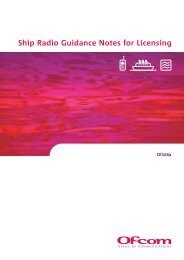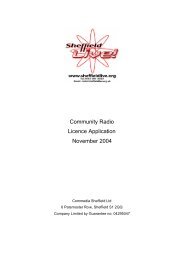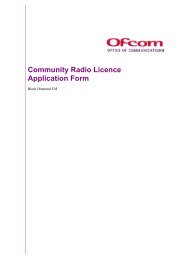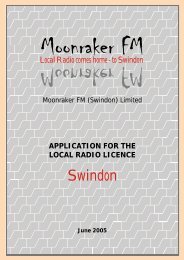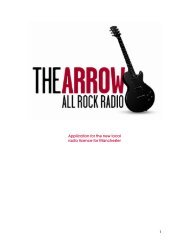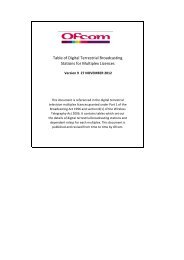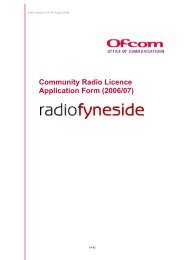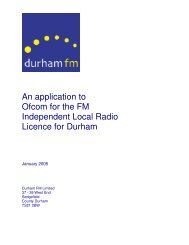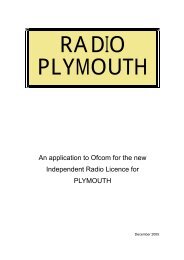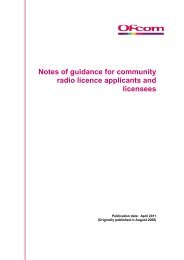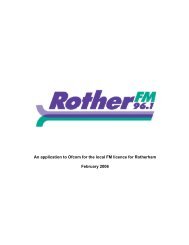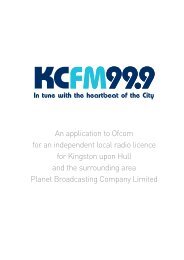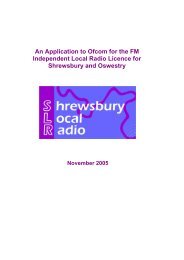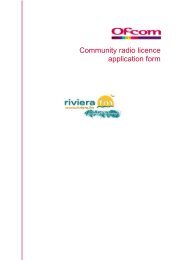Masti Radio - Ofcom Licensing
Masti Radio - Ofcom Licensing
Masti Radio - Ofcom Licensing
Create successful ePaper yourself
Turn your PDF publications into a flip-book with our unique Google optimized e-Paper software.
For example, if we base our TSA on Arqiva’s coverage prediction for a signal strength of<br />
54dB or higher and allow for the effects of expected interference from Real <strong>Radio</strong>, the<br />
total population reached according to 2001 census figures is 2,231,146 (equivalent to<br />
1,792,832 Adults 15+). And the sum of the Asian, Black, Chinese and Mixed Race<br />
sectors represents 8.38% of the total population figure. But if we apply the ethnic group<br />
year-on-year growth percentages mentioned above and contrast them with much smaller<br />
growth expected in the total population we find that by today (2006) our target audience<br />
will already comprise 10.1% of the total Manchester TSA population - and if the same<br />
growth rate continues will represent 12.43% by 2011 and 15.65% in ten years time<br />
(2016).<br />
Of course these figures are averaged across Manchester, so the effect will be even more<br />
dramatic in districts already shown in the 2001 census to have far higher proportions of<br />
people of ethnic origin. For example, Asians alone represented 9.1% of Manchester<br />
(City’s) population in 2001 (twice the 4.6% UK average) the Bolton area also had 9.1%,<br />
Rochdale 9.8% and Oldham 11.9%. Today (2006) these population percentages could<br />
already have risen to 11.4% in Manchester, 10.4% in Bolton; 11.3% in Rochdale and<br />
13.5% in Oldham.<br />
The fact the above are all former mill towns affords a strong clue to the jobs of the<br />
original Asian immigrants, though predominant Asian occupations today tend to be in<br />
service industries, of which property, shop keeping and owning restaurants are probably<br />
the most well known. Meanwhile Manchester’s Black population is concentrated nearer<br />
the city centre, with the Chinese distributed more evenly across Greater Manchester.<br />
Age and Attitude<br />
To fully understand our plans, including how a ‘young’ format within ethnic groups can<br />
be viable and why young Asians need a fundamentally different programming approach<br />
than (Asian Sound already provides for) their elders, it is also important to recognise two<br />
key differences between Asian communities in the UK and those of the indigenous White<br />
population.<br />
1. Non-white populations, including those in Asian communities, are predominantly<br />
young, illustrated by the fact that 30% of the UK ethnic minority population is aged under<br />
16 years, compared to 19% of the white population, with only 10% aged over 55 years,<br />
compared to 25% of Whites. According to a special Rajar breakdown we commissioned<br />
for our original application in 2005, 85.5% of the adult Asian population in Greater<br />
Manchester is aged 15-44, a statistic that underlines the logic of adopting a specifically<br />
‘young’ radio format, which is therefore likely to be directly interesting to a far higher<br />
proportion of the total Asian population than would be the case for another youthfocussed<br />
station within the mainstream/White population.<br />
2. Major differences exist between the cultural identities of the various generations of<br />
Asians living in Britain, a factor closely related to where individuals were born and<br />
brought up. For example, people at the young end of the <strong>Masti</strong> <strong>Radio</strong> target audience<br />
will be third generation Asians who were born and raised in Britain. Their parents<br />
(second generation) may also have been born here, or may have come to Britain as a<br />
result of marriage or because they had relatives already living here. But their<br />
grandparents (first generation) are much more likely to have been raised in an Asian (or<br />
African) country.<br />
19




